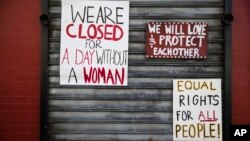Does the United States still have hard work ahead of it in enabling women to attain equality with men? The answer, according to a new large-scale survey, may depend on whether it's coming from a Democrat or a Republican.
The survey, released Wednesday by the Pew Research Center, found a sharp partisan divide on several questions related to gender equality.
According to Pew, Democrats are largely dissatisfied with the nation's progress on this issue — 69 percent say the U.S. hasn't gone far enough when it comes to giving women equal rights. Among Republicans, 54 percent say things are about right; only 26 percent say the country has more work to do.
Do American men have easier lives than women? Another big partisan gap: 49 percent of Democrats say this is true, compared to 19 percent of Republicans.
Among Democrats, those with a college education are far more likely than those with no college experience to express dissatisfaction with the current state of gender equality. While 81 percent of Democrats with at least a bachelor's degree said the U.S. hasn't gone far enough in giving women equal rights, that view was shared by only 55 percent of Democrats with a high school diploma or less. There were no significant education gaps among Republicans in views of the state of gender equality.
Pew's researchers also inquired about personal experiences with gender discrimination.
Overall, 43 percent of women said they have experienced discrimination or been treated unfairly because of their gender, compared to 18 percent of men.
Democratic women were more likely than GOP women to say they experienced such discrimination — 51 percent versus 34 percent. Among men, it's Republicans who more often say they suffered gender discrimination — 20 percent compared to 14 percent of Democratic men.
Large majorities in both parties — 89 percent of Democrats and 74 percent of Republicans — said it's very important for women to have equal rights with men in the U.S. The perceptions differed on where the country is in achieving that goal.
Analyzing the results
The Pew report did not seek to analyze reasons for the partisan gap. Christina Hoff Sommers, a former philosophy professor who is a resident scholar at the American Enterprise Institute, suggested the reasons were complex, but added this observation:
"The Republican Party is the daddy party; the Democratic Party, the mommy party. And now mom's a Feminist," she wrote in an email.
Carrie Lukas, president of conservative Independent Women's Forum, said Pew's findings supported her view that conservatives are focused on creating equal opportunities, not mandating outcomes.
"When they look at society — at how women are outperforming men at every level of education and are increasingly entering and succeeding in new professions and in the public sphere — they think that we are doing tremendously well in moving toward that goal," she said in an email.
"On the other hand, liberals are focused on equal outcomes: they define success as men and women being equally represented in all walks of life," she added. "They are frustrated that we are falling short on this measure, and want government to step in and do something to change those outcomes."
Fatima Goss Graves, president of the National Women's Law Center, said Pew's findings "reflect the current polarized public debate that has only been inflamed by the Trump administration."
"In reality, there isn't a partisan divide for women who experience harassment at work or in school, women who are harmed by the wage gap, or families who are struggling because they don't have affordable child care," Goss Graves said in an email. "And the solutions to these problems shouldn't be partisan either."
The nationally representative survey of 4,573 adults was conducted online Aug. 8-21 and Sept. 14-28, concluding before the national furor over sex harassment allegations against film producer Harvey Weinstein. Participants were recruited via random telephone calls, and those without internet access were provided with it.
Pew said the margin of error for the full sample of responders was plus or minus 2.4 percentage points.




